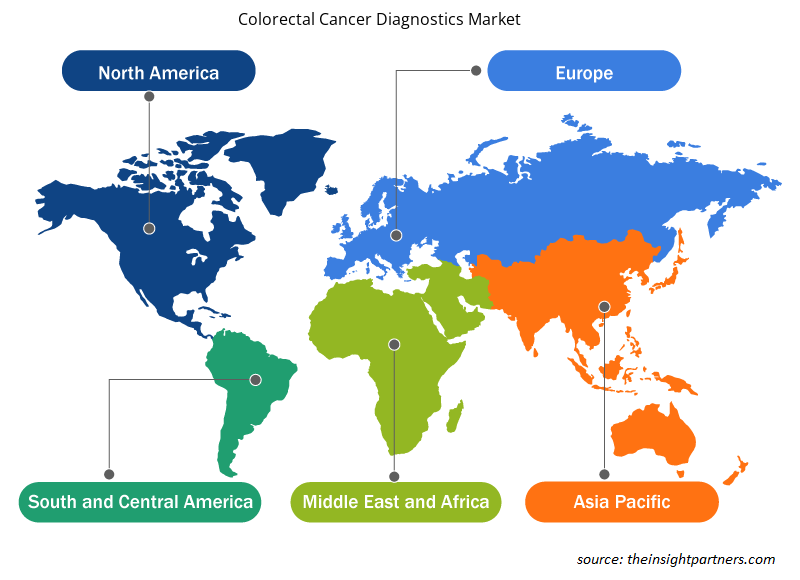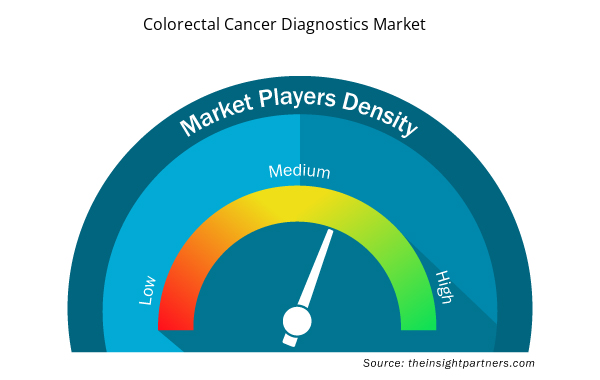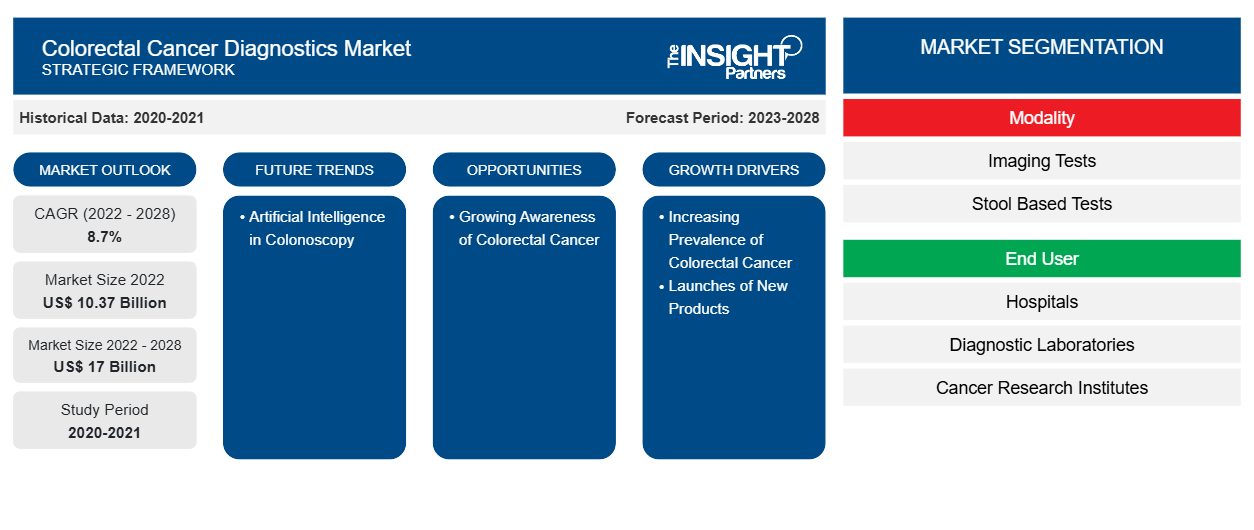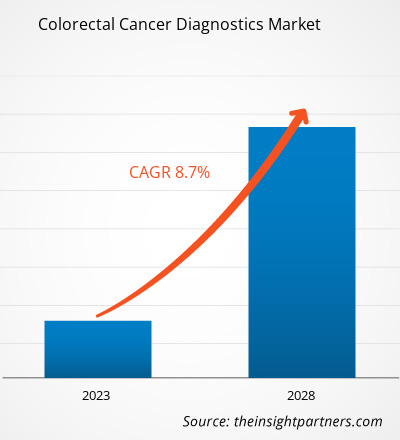[Rapporto di ricerca] Si prevede che il mercato della diagnostica del cancro del colon-retto crescerà da 10.374,68 milioni di dollari nel 2022 a 16.996,48 milioni di dollari entro il 2028; si stima che registrerà un CAGR dell'8,7% dal 2023 al 2028.
Il mercato della diagnostica del cancro colorettale è segmentato in base a modalità, utente finale e geografia. Il rapporto offre approfondimenti e analisi di mercato approfondite, sottolineando parametri quali driver, tendenze, opportunità e analisi del panorama competitivo dei principali attori del mercato in varie regioni. Include anche analisi dell'impatto della pandemia di COVID-19 nelle principali regioni.
Approfondimenti di mercato
Il lancio di nuovi prodotti guida la ricerca colorettale
I principali attori del mercato della diagnostica del cancro colorettale producono un'ampia gamma di dispositivi che aiutano a ridurre il peso del cancro colorettale e altre indicazioni associate come polipi del colon, morbo di Crohn, colite e sindrome dell'intestino irritabile. A luglio 2022, US Digestive Health (USDH), una rete di studi gastrointestinali (GI) di prim'ordine, ha annunciato la commercializzazione di screening di colonscopia assistiti da intelligenza artificiale con la più grande installazione del paese di moduli di endoscopia Genious Intelligent GI. Si prevede che questi moduli aiuteranno i medici a identificare in tempo reale polipi difficili da rilevare e potenzialmente cancerosi. Con il lancio di questo dispositivo, i pazienti della Pennsylvania sudorientale, sudoccidentale e centrale possono ora accedere alla colonscopia assistita da intelligenza artificiale con funzionalità avanzate. A settembre 2020, Olympus Corporation ha annunciato il lancio di ENDO-AID, una piattaforma all'avanguardia basata sull'intelligenza artificiale (IA). La piattaforma include l'applicazione ENDO-AID CADe (app), un metodo endoscopico assistito da computer per il rilevamento di diverse condizioni del colon. Questa nuova piattaforma AI consente la visualizzazione in tempo reale di lesioni sospette rilevate automaticamente e funziona in combinazione con il suo EVIS X1. Pertanto, gli sviluppi frequenti e i lanci di nuovi prodotti guidano la crescita del mercato della diagnostica del cancro colorettale.
Personalizza questo report in base alle tue esigenze
Riceverai la personalizzazione gratuita di qualsiasi report, comprese parti di questo report, o analisi a livello nazionale, pacchetto dati Excel, oltre a usufruire di grandi offerte e sconti per start-up e università
- Scopri le principali tendenze di mercato in questo rapporto.Questo campione GRATUITO includerà analisi di dati che spaziano dalle tendenze di mercato alle stime e alle previsioni.
Approfondimenti basati sulla modalità
In base alla modalità, il mercato della diagnostica del cancro colorettale è diviso in test basati sulle feci e test di imaging. Nel 2022, il segmento dei test di imaging ha detenuto una quota maggiore del mercato della diagnostica del cancro colorettale e si prevede che registrerà un CAGR più elevato durante il periodo di previsione. L'uso dei test di imaging nella diagnostica del cancro colorettale si è evoluto negli ultimi anni. I risultati di imaging sono fondamentali per la sorveglianza, la diagnosi, la stadiazione, la selezione del trattamento e la pianificazione del follow-up. I test di imaging comportano l'esame della struttura del colon e del retto per la presenza di aree anomale. Gli esami di imaging utilizzano endoscopi, strumenti simili a tubi con una luce e una piccola videocamera all'estremità, inseriti nel retto. Questi test esaminano l'interno del colon e del retto per eventuali aree anomale che potrebbero essere cancro o polipi. Questi test sono utilizzati meno spesso dei test basati sulle feci e richiedono una maggiore preparazione preventiva e presentano alcuni rischi associati, a differenza dei test basati sulle feci. Gli esami di diagnostica per immagini sono ulteriormente classificati in colonscopia, colonscopia con tomografia computerizzata, sigmoidoscopia flessibile, endoscopia capsulare e altri.
Il segmento della colonscopia ha detenuto la quota maggiore del mercato nel 2022. Tuttavia, si prevede che la colonografia TC crescerà a un ritmo più rapido durante il periodo di previsione. La colonografia TC aiuta nell'analisi morfologica delle deformità della parete, fornendo le informazioni necessarie per la valutazione preoperatoria della stadiazione T nel cancro del colon-retto. Secondo le linee guida dei criteri di valutazione della risposta nei tumori solidi (RECIST), la TC è la modalità più ampiamente utilizzata per valutare la risposta al trattamento nei pazienti con tumori del colon e del retto metastatizzati. I vantaggi comuni della colonografia TC sono i seguenti: è rapida e sicura, aiuta a visualizzare l'intero colon e non è richiesta alcuna sedazione per eseguire il test. Si raccomanda di eseguire questo test ogni cinque anni nei pazienti asintomatici con rischio medio.
Informazioni basate sull'utente finale
In base all'utente finale, il mercato della diagnostica del cancro colorettale è segmentato in ospedali, laboratori diagnostici, istituti di ricerca sul cancro e altri. Il segmento degli ospedali ha rappresentato la quota di mercato maggiore nel 2022 e si prevede che registrerà il CAGR più elevato durante il periodo di previsione.
Gli operatori del mercato della diagnostica del cancro colorettale adottano strategie organiche come il lancio e l'espansione del prodotto per espandere la propria impronta geografica e i portafogli di prodotti e soddisfare le crescenti richieste. Le strategie di crescita inorganica adottate dagli operatori del mercato consentono loro di espandere le proprie attività e migliorare la propria presenza geografica. Inoltre, queste strategie di crescita aiutano le aziende a rafforzare la propria clientela e ad ampliare i propri portafogli di prodotti.
- A dicembre 2022, Epigenomics ottiene la licenza per la tecnologia dei biomarcatori proteici per il test del cancro colorettale basato sul sangue. La società ha ottenuto la licenza dal The University of Texas MD Anderson Cancer Center per alcuni brevetti e diritti tecnologici sui biomarcatori associati alla rilevazione del cancro colorettale.
- Ad agosto 2021, Illumina ha acquisito GRAIL per accelerare l'accesso dei pazienti al test di rilevamento precoce multi-cancro salvavita. Il test del sangue Galleri di GRAIL rileva 50 diversi tumori prima che diventino sintomatici. L'acquisizione di GRAIL da parte di Illumina accelererà l'accesso e l'adozione di questo test salvavita in tutto il mondo.
Approfondimenti regionali sul mercato della diagnostica del cancro colorettale
Le tendenze regionali e i fattori che influenzano il mercato della diagnostica del cancro colorettale durante il periodo di previsione sono stati ampiamente spiegati dagli analisti di Insight Partners. Questa sezione discute anche i segmenti del mercato della diagnostica del cancro colorettale e la geografia in Nord America, Europa, Asia Pacifico, Medio Oriente e Africa e Sud e Centro America.

- Ottieni i dati specifici regionali per il mercato della diagnostica del cancro colorettale
Ambito del rapporto di mercato sulla diagnostica del cancro colorettale
| Attributo del report | Dettagli |
|---|---|
| Dimensioni del mercato nel 2022 | 10,37 miliardi di dollari USA |
| Dimensioni del mercato entro il 2028 | 17 miliardi di dollari USA |
| CAGR globale (2022 - 2028) | 8,7% |
| Dati storici | 2020-2021 |
| Periodo di previsione | 2023-2028 |
| Segmenti coperti | Per modalità
|
| Regioni e Paesi coperti | America del Nord
|
| Leader di mercato e profili aziendali chiave |
|
Densità degli operatori del mercato della diagnostica del cancro colorettale: comprendere il suo impatto sulle dinamiche aziendali
Il mercato della diagnostica del cancro colorettale sta crescendo rapidamente, spinto dalla crescente domanda degli utenti finali dovuta a fattori quali l'evoluzione delle preferenze dei consumatori, i progressi tecnologici e una maggiore consapevolezza dei benefici del prodotto. Con l'aumento della domanda, le aziende stanno ampliando le loro offerte, innovando per soddisfare le esigenze dei consumatori e capitalizzando sulle tendenze emergenti, il che alimenta ulteriormente la crescita del mercato.
La densità degli operatori di mercato si riferisce alla distribuzione di aziende o società che operano in un particolare mercato o settore. Indica quanti concorrenti (operatori di mercato) sono presenti in un dato spazio di mercato in relazione alle sue dimensioni o al valore di mercato totale.
Le principali aziende che operano nel mercato della diagnostica del cancro colorettale sono:
- Medtronica SpA
- Illumina Inc
- Tecnologie di genomica clinica Pty Ltd
- Società Biotech EDP
- Epigenomica AG
Disclaimer : le aziende elencate sopra non sono classificate secondo un ordine particolare.

- Ottieni una panoramica dei principali attori del mercato della diagnostica del cancro colorettale
Profili aziendali
- Medtronica SpA
- Illumina Inc
- Tecnologie di genomica clinica Pty Ltd
- Società Biotech EDP
- Epigenomica AG
- F. Hoffmann-La Roche Ltd
- Diagnostica di Quest Inc.
- Novigenix SA
- Siemens Healthineers Italia S.p.A.
- Società Bruker
- Società chimica Eiken
- Analisi storica (2 anni), anno base, previsione (7 anni) con CAGR
- Analisi PEST e SWOT
- Valore/volume delle dimensioni del mercato - Globale, regionale, nazionale
- Industria e panorama competitivo
- Set di dati Excel



Report Coverage
Revenue forecast, Company Analysis, Industry landscape, Growth factors, and Trends

Segment Covered
This text is related
to segments covered.

Regional Scope
North America, Europe, Asia Pacific, Middle East & Africa, South & Central America

Country Scope
This text is related
to country scope.
Domande frequenti
Colorectal cancer diagnostics refers to the tools, kits and test performed on an individual to diagnose colorectal cancer in an individual. This involves series of non-invasive and invasive test to confirm the cancer and its stage based on that treatment will be provided to the patient.
Asia Pacific is expected to be the fastest growing region in the colorectal cancer diagnostics market. Asia Pacific registered as the fastest-growing region in the global colorectal cancer diagnostics market. The market in this region is driven due to rising incidences of colorectal cancer, easy access to the diagnosis for colorectal cancer, and proposing guidelines for the procedures. Also, increasing government funding for research activities in colorectal cancer is expected to propel the growth of the market for colorectal cancer diagnostics in Asia Pacific.
The colorectal cancer diagnostics market, based on modality, is bifurcated into imaging tests and stool based tests. In 2022, the imaging tests segment held the larger share and is expected to grow at a CAGR of 8.8% during the forecast period. Screening and imaging play a vital role in the diagnostics of colorectal cancer to understand the extent of tumor-affected area, that act as a major driving factor for the growth of the imaging tests segment.
The factors that are driving growth of the market are increasing prevalence of colorectal cancer and launches of new products.
The US holds the largest market share in colorectal cancer diagnostics market. The growth of the market in the country is because in 2022, more than 600,000 surgeries are performed annually in the US to treat colon diseases. According to the American Cancer Society, the 5-year survival rate for localized colon cancer is 91% and for localized rectal cancer is 90%.
The colorectal cancer diagnostics market majorly consists of the players such as Medtronic Plc, Illumina Inc, Clinical Genomics Technologies Pty Ltd, EDP Biotech Corp, Epigenomics AG, F Hoffmann-La Roche Ltd, Quest Diagnostics Inc, Novigenix SA, Siemens Healthineers AG, Bruker Corp, and Eiken Chemical Co Ltd.
Trends and growth analysis reports related to Life Sciences : READ MORE..
The List of Companies - Colorectal Cancer Diagnostics Market
- Medtronic Plc
- Illumina Inc
- Clinical Genomics Technologies Pty Ltd
- EDP Biotech Corp
- Epigenomics AG
- F. Hoffmann-La Roche Ltd
- Quest Diagnostics Inc
- Novigenix SA
- Siemens Healthineers AG
- Bruker Corp
- Eiken Chemical Co., Ltd.
The Insight Partners performs research in 4 major stages: Data Collection & Secondary Research, Primary Research, Data Analysis and Data Triangulation & Final Review.
- Data Collection and Secondary Research:
As a market research and consulting firm operating from a decade, we have published and advised several client across the globe. First step for any study will start with an assessment of currently available data and insights from existing reports. Further, historical and current market information is collected from Investor Presentations, Annual Reports, SEC Filings, etc., and other information related to company’s performance and market positioning are gathered from Paid Databases (Factiva, Hoovers, and Reuters) and various other publications available in public domain.
Several associations trade associates, technical forums, institutes, societies and organization are accessed to gain technical as well as market related insights through their publications such as research papers, blogs and press releases related to the studies are referred to get cues about the market. Further, white papers, journals, magazines, and other news articles published in last 3 years are scrutinized and analyzed to understand the current market trends.
- Primary Research:
The primarily interview analysis comprise of data obtained from industry participants interview and answers to survey questions gathered by in-house primary team.
For primary research, interviews are conducted with industry experts/CEOs/Marketing Managers/VPs/Subject Matter Experts from both demand and supply side to get a 360-degree view of the market. The primary team conducts several interviews based on the complexity of the markets to understand the various market trends and dynamics which makes research more credible and precise.
A typical research interview fulfils the following functions:
- Provides first-hand information on the market size, market trends, growth trends, competitive landscape, and outlook
- Validates and strengthens in-house secondary research findings
- Develops the analysis team’s expertise and market understanding
Primary research involves email interactions and telephone interviews for each market, category, segment, and sub-segment across geographies. The participants who typically take part in such a process include, but are not limited to:
- Industry participants: VPs, business development managers, market intelligence managers and national sales managers
- Outside experts: Valuation experts, research analysts and key opinion leaders specializing in the electronics and semiconductor industry.
Below is the breakup of our primary respondents by company, designation, and region:

Once we receive the confirmation from primary research sources or primary respondents, we finalize the base year market estimation and forecast the data as per the macroeconomic and microeconomic factors assessed during data collection.
- Data Analysis:
Once data is validated through both secondary as well as primary respondents, we finalize the market estimations by hypothesis formulation and factor analysis at regional and country level.
- Macro-Economic Factor Analysis:
We analyse macroeconomic indicators such the gross domestic product (GDP), increase in the demand for goods and services across industries, technological advancement, regional economic growth, governmental policies, the influence of COVID-19, PEST analysis, and other aspects. This analysis aids in setting benchmarks for various nations/regions and approximating market splits. Additionally, the general trend of the aforementioned components aid in determining the market's development possibilities.
- Country Level Data:
Various factors that are especially aligned to the country are taken into account to determine the market size for a certain area and country, including the presence of vendors, such as headquarters and offices, the country's GDP, demand patterns, and industry growth. To comprehend the market dynamics for the nation, a number of growth variables, inhibitors, application areas, and current market trends are researched. The aforementioned elements aid in determining the country's overall market's growth potential.
- Company Profile:
The “Table of Contents” is formulated by listing and analyzing more than 25 - 30 companies operating in the market ecosystem across geographies. However, we profile only 10 companies as a standard practice in our syndicate reports. These 10 companies comprise leading, emerging, and regional players. Nonetheless, our analysis is not restricted to the 10 listed companies, we also analyze other companies present in the market to develop a holistic view and understand the prevailing trends. The “Company Profiles” section in the report covers key facts, business description, products & services, financial information, SWOT analysis, and key developments. The financial information presented is extracted from the annual reports and official documents of the publicly listed companies. Upon collecting the information for the sections of respective companies, we verify them via various primary sources and then compile the data in respective company profiles. The company level information helps us in deriving the base number as well as in forecasting the market size.
- Developing Base Number:
Aggregation of sales statistics (2020-2022) and macro-economic factor, and other secondary and primary research insights are utilized to arrive at base number and related market shares for 2022. The data gaps are identified in this step and relevant market data is analyzed, collected from paid primary interviews or databases. On finalizing the base year market size, forecasts are developed on the basis of macro-economic, industry and market growth factors and company level analysis.
- Data Triangulation and Final Review:
The market findings and base year market size calculations are validated from supply as well as demand side. Demand side validations are based on macro-economic factor analysis and benchmarks for respective regions and countries. In case of supply side validations, revenues of major companies are estimated (in case not available) based on industry benchmark, approximate number of employees, product portfolio, and primary interviews revenues are gathered. Further revenue from target product/service segment is assessed to avoid overshooting of market statistics. In case of heavy deviations between supply and demand side values, all thes steps are repeated to achieve synchronization.
We follow an iterative model, wherein we share our research findings with Subject Matter Experts (SME’s) and Key Opinion Leaders (KOLs) until consensus view of the market is not formulated – this model negates any drastic deviation in the opinions of experts. Only validated and universally acceptable research findings are quoted in our reports.
We have important check points that we use to validate our research findings – which we call – data triangulation, where we validate the information, we generate from secondary sources with primary interviews and then we re-validate with our internal data bases and Subject matter experts. This comprehensive model enables us to deliver high quality, reliable data in shortest possible time.


 Ottieni un campione gratuito per questo repot
Ottieni un campione gratuito per questo repot